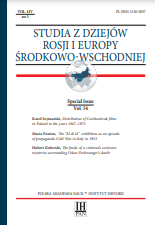Senyk’s Archive and its significance for studies on the behind-the-scenes picture of the Organisation of Ukrainian Nationalists. New research perspectives in the light of discovered correspondence
Senyk’s Archive and its significance for studies on the behind-the-scenes picture of the Organisation of Ukrainian Nationalists. New research perspectives in the light of discovered correspondence
Author(s): Magdalena GibiecSubject(s): Political history, Social history, Nationalism Studies, Interwar Period (1920 - 1939), Asylum, Refugees, Migration as Policy-fields
Published by: Instytut Historii im. Tadeusza Manteuffla Polskiej Akademii Nauk
Keywords: Senyk’s Archive; Bronisław Pieracki’s murder; Organisation of Ukrainian Nationalists; Second Polish Republic; Ukrainian emigration;
Summary/Abstract: The assassination of Bronisław Pieracki, Polish Minister of Interior, which took place in 1934, was the most significant operation carried out by the Organisation of Ukrainian Nationalists during the interwar period, and was a consequence of tense Polish-Ukrainian relations. The so-called Senyk’s Archive, discovered by Czechoslovakian intelligence in 1933 and handed over to the Polish authorities, was disclosed too late to prevent the tragedy, yet it became grounds for the formulation of an indictment against Stepan Bandera and other OUN members involved in terrorist activities against the Second Polish Republic. The archive consists of about 700 letters exchanged by the members of the OUN Board in exile. The author of the present article has discovered them in the Central State Historical Archive of Ukraine in Lviv. The discovery of these documents raises new research problems, and also allows us to answer questions that have remained a mystery until now. The analysis of the letters will allow to fill the gaps not only in our knowledge of the functioning of the OUN, but also in the Polish-Ukrainian relations of the interwar period. It will also constitute an important contribution to the understanding of the emergence of nationalism throughout Europe in the 1930s. The international context is also very important. The letters of OUN members provide the researchers with insight not only into the internal modus operandi of the group, but also into their lobbying efforts, conducted all over the world. The OUN sought to establish cooperation with Poland’s neighbours (Germany, Czechoslovakia, Lithuania), as well as Western European powers (e.g. Great Britain, Italy), Canada and the United States, i.e. wherever the Ukrainian diaspora was active. The author’s intention is to outline the context of Senyk’s Archive, thus summarising the current state of knowledge and, above all, indicating research perspectives.
Journal: Studia z Dziejów Rosji i Europy Środkowo-Wschodniej
- Issue Year: 54/2019
- Issue No: Sp.
- Page Range: 109-126
- Page Count: 18
- Language: English

